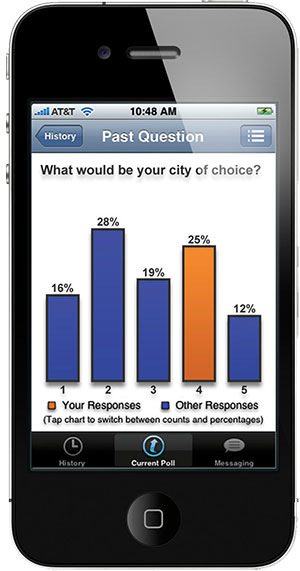Clickers Go Mobile
Two universities are using a student response app to make classes more interactive, without the need for specialized hardware.

Shutterstock.com
Student response systems, also known as clickers, once relied on specialized hardware. And while they were an important tool in many classrooms — for taking attendance, polling and more — there was a problem: keeping the devices in students' hands.
"It was a hassle to deal with clickers," recalled Leslie Bofill, director of educational technology at Florida International University. "Students would forget to bring them to class, or the batteries would be dead, so some students had to switch to a loaner clicker within the class."
So Bofill ditched the hardware and introduced Turning Technologies' ResponseWare app to 120 medical students last August. The app turns any Web-enabled device into a virtual clicker, with iPhone and Android versions available for both smartphones and tablets.
Bofill, who manages all educational technology tools for both faculty and students, explained that an app allows for a number of options. The FIU students are provided laptops or tablets by the university, but in a pinch they can also use whatever mobile device they have at hand. "Although laptops are required, if they're using a tablet or smartphone, just by going to a URL on the device, or downloading the app version, they can get on board." It also simplifies instruction at the front of the class, as there is no receiver hardware needed.
"Before the app," Bofill noted, "we took attendance with clickers — but students would say they lost the clicker, or left it at home. Sometimes, students would switch clickers. Also, we had to do the paperwork manually. There might be 10 or twelve students in any given class without a clicker. This is administratively taxing. We had to see the dean to send the clickers out to students — or we had to buy batteries. And the faculty had to reset passwords."
With the app, there's a one-time setup with the password. Students can then reset their own password going forward.
"Because ResponseWare is cloud-based," Bofill added, "we don't have to apply patches or update; the vendor provides its own updates. It also allows for direct integration with LMS. We no longer have to put grades in manually."
Boosting Participation
It's a similar story at Palm Beach Atlantic University, where Jim Mitroka, associate professor of pharmaceutical sciences, is another proponent of the ResponseWare app. "Up to a few years ago, we used handheld clickers. They worked well, but there was always a problem with [students] forgetting devices, and a hassle with distributing them," he explained.

Turning Technologies' ResponseWare mobile app
When Turning Technologies offered the app several years ago, Mitroka "jumped on board," and continues to work successfully with it in his pharmaceutical classes. "Now students can respond with their own personal device," he said. "Everybody is on the same page with software, communication protocol, etc. And there's one IT person to handle any problems that might arise."
In a typical class of 75 people, Mitroka noted, three students often dominate the discussion, answering all of the instructor's questions. In contrast, with the student response system, "we get really good participation," he said. Mitroka has his students go through a narrated PowerPoint prior to class. Then in class, using the TurningPoint interface, the students get a quiz. "First, they answer the quiz on their own," he explained. "The second time around they discuss with their colleagues what the right answer is. This is the team response. Their grade is an average of how they did on the individual and team part of the quiz."
Another benefit: Nobody has to worry about looking foolish, because answers are anonymous. The app transfers student responses to an interactive polling slide showing the aggregate response data, and also stores the data for future evaluation.
Student Reaction
"The students are enjoying it," Mitroka said. "If I give a straight lecture, they're disappointed. They're not as engaged or challenged. Although they might not like using the app for grades or quizzes, and might prefer traditional exams, there's no question thy like it for assessing how they're following the material."
On the other hand, Bofill reported that student response at FIU has been a "mixed bag." Complaints typically have to do with faculty use of the app as a tool for taking attendance, she explained. "That's really the only complaint," she said. "Most of the faculty use it for formative quizzes, or intersperse questions with students. It keeps students engaged. And, for the most part, students won't ask questions without it."
Bottom Line
Mitroka stressed that the type of technology used doesn't matter to him as an instructor. "I don't care how [students] do it," he said. "Laptops are not a requirement. A number of students use smartphones or tablets. We have a mix, but the overwhelming majority use a PC tablet."
He concluded: "Because there's a lot of specific information [in the field], I find the app useful for teaching pharmaceutical sciences. It makes difficult material more interactive, and my students can access it on a cellphone. The questions don't have to be flat text. They can have a structure, and then we can ask about the structure. It's not just factual information, but we can get at some deep level of information. I can even put up an essay question, such as, 'What did you find muddy about today's lecture?' This gives me a nice summary of what everybody is struggling with. And, instead of 75 handwritten cards, I get a spreadsheet with names and responses. It's just text. I can't do it automatically. But I have all the information in a single file."